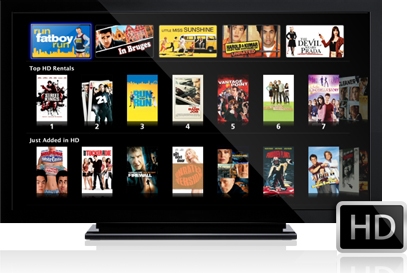

The Apple rumour mill is buzzing once again over the company’s widely expected move into the television market sometime this year.
Topeka Capital analyst Brian White took a trip to Taiwan to see what he could find out about Apple’s plans, and is reporting just the sort of juicy details that we’ve come to expect from the company that reimagined music players, mobile phones and tablet computers.
White, according to Business Insider, believes Apple has developed an “iRing,” an accessory that acts “as a navigation pointer for ‘iTV,’ enhancing the motion-detection experience and negating some of the functionality found in a remote.”
White also said that the iTV will come in 60- and 50- to 55-inch options, and that each iTV will come with a “mini iTV” that users will be able to direct content to. The mini iTV will be able to connect to its big brother from up to 200-plus yards, so a user can carry it into the kitchen, the backyard, a bedroom, etc.
“While the ‘mini iTV’ screens will be similar in size compared to the iPad, and thus allow for some manufacturing efficiencies, the capabilities and features will be very basic and thus not an iPad replacement,” White wrote in a research note.
Topeka Capital also expects Apple’s rumoured iWatch to play into the ecosystem and complement the iRing.
White wrote:
The interaction between “iTV” and making phone calls will be an important feature of this experience, while the “iWatch” and the “iRing” will provide increased mobility around the home, supplanting the need to carry a smartphone around the house.
Finally, we believe consumers will pay approximately $1,500 (£991) to $2,500 (£1,652) for the “iTV” package. The price will be based on the number of “mini iTV” screens in the package and the screen size of the “ITV.”
Also, we are being told that “iTV” could be subsidised by certain service providers to expand the market opportunity.
The Samsung TVs were also very like kitchen-counter computers, in that they offered access to various hubs – for photos, for music, for programming recommendations. And perhaps most importantly, they also offer access to Samsung’s TV app store, which opened in January 2010.
They’re televisions that incorporate technologies we’re accustomed to in other aspects of our lives, and in that way they’re exciting. But they’re not revolutionary, in the ways that the market expects Apple to be.
Research firm Gartner expects that an Apple TV would enter a very competitive market. The firm said that 85 percent of the flat-panel TVs produced in 2016 will be “smart” TVs – sets that can access the Internet and online content, as well as traditional broadcasts.
Gartner expects television sales to rise from 2012’s 69 million units to 198 million units in 2016.
While Apple has not confirmed that it is working on a television, CEO Tim Cook gave a nod to the idea, telling NBC’s Brian Williams, during a 6 December 2012 interview that the television market “has been left behind” and feels outdated by decades.
“It’s an area of intense interest to us,” Cook said.
Are you an insanely great Apple expert? Try our quiz!
Originally published on eWeek.
Notable development for Meta, after appeal against 2021 WhatsApp privacy fine is backed by advisor…
First sign of shakeup under new CEO Lip-Bu Tan? Three Intel board members confirm they…
Trump's nominee for SEC Chairman, Paul Atkins, has pledged a “rational, coherent, and principled approach”…
After being 'retired' by Intel's board of directors, ex-CEO Pat Gelsinger has joined a VC…
President touts easing Chinese tariffs to facilitate TikTok sale, and also implements 25 percent tariff…
Copyright lawsuit against OpenAI and Microsoft from The New York Times and other newspapers can…